As vascular neurologists continued to throw questions at Kerry Pray, answering the doctors became increasingly difficult for her.
Pray was trying her hardest to push out words in English. The words that eventually poured from her mouth were not what her heart wanted, but they were, at that time, the only words she could manage.
Among bewildered doctors at the Greater Baltimore Medical Center, the English professor could speak only Welsh.
Luckily, her humor was still intact.
“Initially in the hospital, I felt vaguely amused by it. I thought it was kind of funny,” Pray said. “I’m talking Welsh and people are running around and freaking out and they’re asking me questions and I could only answer in Welsh.”
In March during the middle of the 2024 spring semester, Pray, an English professor at Stevenson, experienced a stroke, which has since greatly impacted her life. Although her everyday life has changed, she still continues to encourage students and share her passion for writing throughout her recovery.
In the weeks leading up to her stroke, Pray was taking Myfembree, a hormone blocker for her previous medical complications. One side effect of Myfembree is the chance of experiencing a stroke. Pray’s first side effect was a headache that drove her to an urgent care facility.
At urgent care, a doctor conducted many neurological tests, one of which Pray failed.
“There was one where you hold your hands up and you close your eyes” Pray said, “And I felt my arm fall.”
When this happened, Pray’s doctor, worried for her, sent her to the hospital. Before she entered the stroke center, she was able to code switch between English and Welsh; however, once inside, months of physical and emotional complications would begin.
“The moment that I started to get words out in Welsh, that’s the moment I was like ‘oh, there is something going on in my brain,’” Pray said.
One thing that was going on in Pray’s brain was an uncommon language disorder called bilingual aphasia.
“The term bilingual aphasia is used to refer to aphasia in persons who speak two or more languages,” National Library of Medicine defines. “When a multilingual speaker has aphasia following a stroke, the languages spoken premorbidly may show comparable or differential patterns of impairment.”
While doctors were peppering her with questions, mostly concerned that the English professor was unable to speak in English, Pray discovered that writing in English was not a problem.
Since Pray’s stroke was never caught on any medical imaging programs, doctors were not able to confidently diagnosis her as a stroke patient, so they treated her as if she was recovering from a migraine and a stroke.
While Dr. Pray was in and out of the hospital, the Francis Scott Key Bridge fell. Nightmares plagued her.
Pray refers to this time in her life as the time spent away with the dark fairies. She uses a fantasy metaphor because of how disjointed and wrong her brain and dreams felt.
“It was always a mixture of broken pieces and pathway and there would be somebody standing next to some sort of electrical wire saying this is the dead pathway,” Pray said. “It’s almost like the brain was trying to rewire itself.”
For the first couple of weeks that followed her stroke, the nightmare turned into a time of emotional and physical pain. Pray remarked that for several weeks her brain felt altered in a way that she could taste.
“It tasted like ash, and I felt like I was disconnected from reality but only for a microsecond,” Pray said. “I could feel these smoking embers of death and I would try to process things, but I just couldn’t.”
A week after leaving the hospital Pray began to experience physical panic attacks. These events would range from episodes of vision loss to the feeling of being kicked in the chest.
Although the doctors dubbed these events as panic attacks, Pray recounted that she did not feel panicked. In the beginning the attacks induced no emotional response, but as they continued, the attacks made Pray feel as though she was about to die.
“I started thinking I needed to get like a piece of paper and start writing down passwords,” Pray said. “I wouldn’t be scared, but I would just be like I need to write these things down really quick before I’m gone.”
In the corner of Pray’s office there is a floral-patterned armchair that looks as though it was pulled straight from the interior of a cottage covered in vines. Next to that chair is a wooden bookshelf overflowing with books about King Arthur, Jiffy peanut butter snacks and cans of diet Coke.
Bright Green vines drape over Pray’s black bookshelf as if they are claiming the contents of the shelf as their own. In the other corner facing the armchair is a small blue couch for visiting students to sit.
This is what students see when they come to visit Pray during her office hours. What they do not see is the papers with passwords scribbled on them and notes to her kids in her room at home.
“Last-minute things when you think you have a minute to live, because that’s what it felt like,” Pray said. “If you’ve heard that phrase ‘you can’t walk and chew gum at the same time’, that’s literally me.”
While the left side of her brain is making it hard for her to find words in her mother tongue, the right side of her body is struggling mechanically.
Every human being has their own set of capabilities. Some people are proficient in math, some skilled with their hands and others are able to achieve impressive physical feats. These proficiencies that humans possess vary from person to person.
Before her stroke, Pray was not only proficient at pacing back and forth in the classroom as she helped students put their imaginations down on paper, but she was also a marathon runner.
“I used to think that if you just focus and you just work hard enough you could do whatever you wanted to do,” Pray said. “And that’s not true, there are some things that no matter how hard I work towards, I won’t be able to do them.”
Pray ran her last marathon over 20 years ago. At one point, she was able to run, but now the thought of moving her right foot is a task.
“To lift my foot, it hurts,” Pray said. “It hurts my head, not my foot.”
Due to the mental strain that walking causes Pray, she uses a mobility scooter to travel to and from class. When the scooter is not in use, she has one hand on a cane topped with a handle resembling a crow skull, and the other is around her Hawaiian shirt-wearing ponytailed friend.
Pray has not been alone in her recovery. Alexis Turner has assisted Pray for the last year with driving, movement and teaching. Turner and Pray have been friends for over six years. A year before Pray had her stroke, they both spent much of their time together.
“We’re both a little ADHD and focus a little better when somebody else is in the room,” Turner said. “I probably would not have finished my dissertation if I didn’t have a writing buddy.”
Because Turner was working on their PhD, they were able to help Pray for free over the spring and summer. Once the fall semester rolled around, Pray was able to raise money through GoFundMe to pay Turner.
Turner is in the process of looking for an academic job. Due to them being in a transitional period in their life, they have availability. Turner admits that even though they graduated from Harvard University, it still may take a couple years to find a faculty position.
Turner also explains that being a caretaker is not something that fits perfectly on a resume, yet they still work four days a week.
“I know it’s unusual, but I wish it weren’t unusual,” Turner said. “I think everyone should be able to just say oh, you need a hand let me give you a hand.”
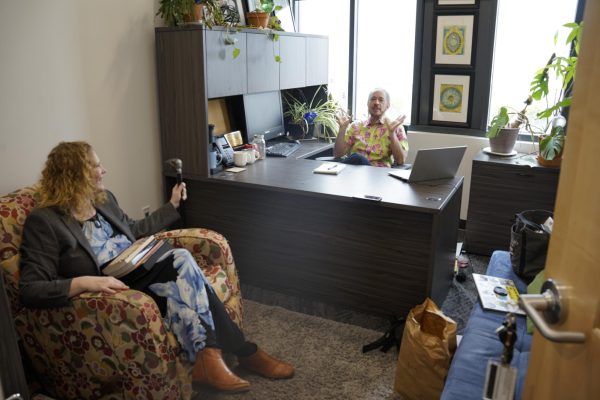
As Pray can do more things on her own, Turner spends time in her office making money through online tarot readings and website design. Pray has not had the funds to pay them during the 2025 spring semester; however, she has found other ways to thank her friend.
“She also sometimes spoils me by taking me out to dinner,” Turner said. “That’s how she pays me at the moment.”
Pray has not stopped teaching. After teaching online classes from the hospital in the spring, a summer of physical therapy, speech therapy and publishing a book, she came back to campus in person to teach in the fall.
To ensure that her class runs smoothly, she has built fail safes into her everyday classroom experience. One of which is to sing.
When I first met Pray, it was her first semester back teaching in person during the 2024 fall semester in the School of Business. The broad-shouldered, institution-like building looms over Stevenson University’s main campus as if challenging its students to enter.
This brick building teeming with students in business attire and the interior decoration of a New York Stock Exchange lobby is a stark contrast to Pray’s character.
As she entered class on the first day, the room felt as quiet as a padded room with only the buzz of her mobility scooter’s electrical motor filling the air. Her earth-toned dress stood out in the plain white classroom as if someone had planted a tree in the middle of a conference room.
While buttoned-up finance professors in the School of Business walked their class through the syllabus, Pray was lost in amusement as her students were harmonizing to Rick Astley’s “Never Gonna Give You Up.”
During the 2024 fall semester, bilingual aphasia occasionally came back to haunt Pray. When Welsh was the only language her brain will let her speak in, she discovered that she could sing her way back to English.
In March 2025, a year had passed since she first went to the hospital for her stroke. She still has minor speech difficulties. She still needs assistance while walking. And she still has not stopped teaching.
“This time last year I was a high fall risk not allowed to use the restroom without help in the hospital of the stroke ward,” Pray said. “So yeah, I’m much better than I was.”
Pray has changed the way students think about writing. Second-year business communication student Gavin Little explained that previous college courses made writing feel like a chore.
“What I liked most about taking her class is that the class wasn’t really about taking notes,” Little said. “It was more about using your imagination and opening your mind to stuff you’re not used too.”
From a young age, Pray has always felt called to write. Whether teaching classes in a hospital bed from her computer or looking at her students face to face through a pair of red reading glasses, Pray has made it her priority to share her passion for writing.
To Pray, writing is how people connect to one another. Pray believes that it’s not just a way to share information but a form of magic. Merriam-Webster also provides a connection between writing and magic.
“Spell referring to magic incantation is of different origin. That word is strictly Germanic (from the noun spel) and refers to talk, storytelling, gossip and a sermon.”
Pray’s speech was lost at one point. But her stories are documented in the books she has published, and her inspiration instilled in her students. Pray may never fully recover the strength in the left side of her body; however, she will never lose her passion for putting words down on paper.
“You can write about science, you can write about alchemy, you can write about King Arthur, you can write about plants, you can write about fairies, you can write about ravens. Every human endeavor in the world meets itself with words,” Pray said.



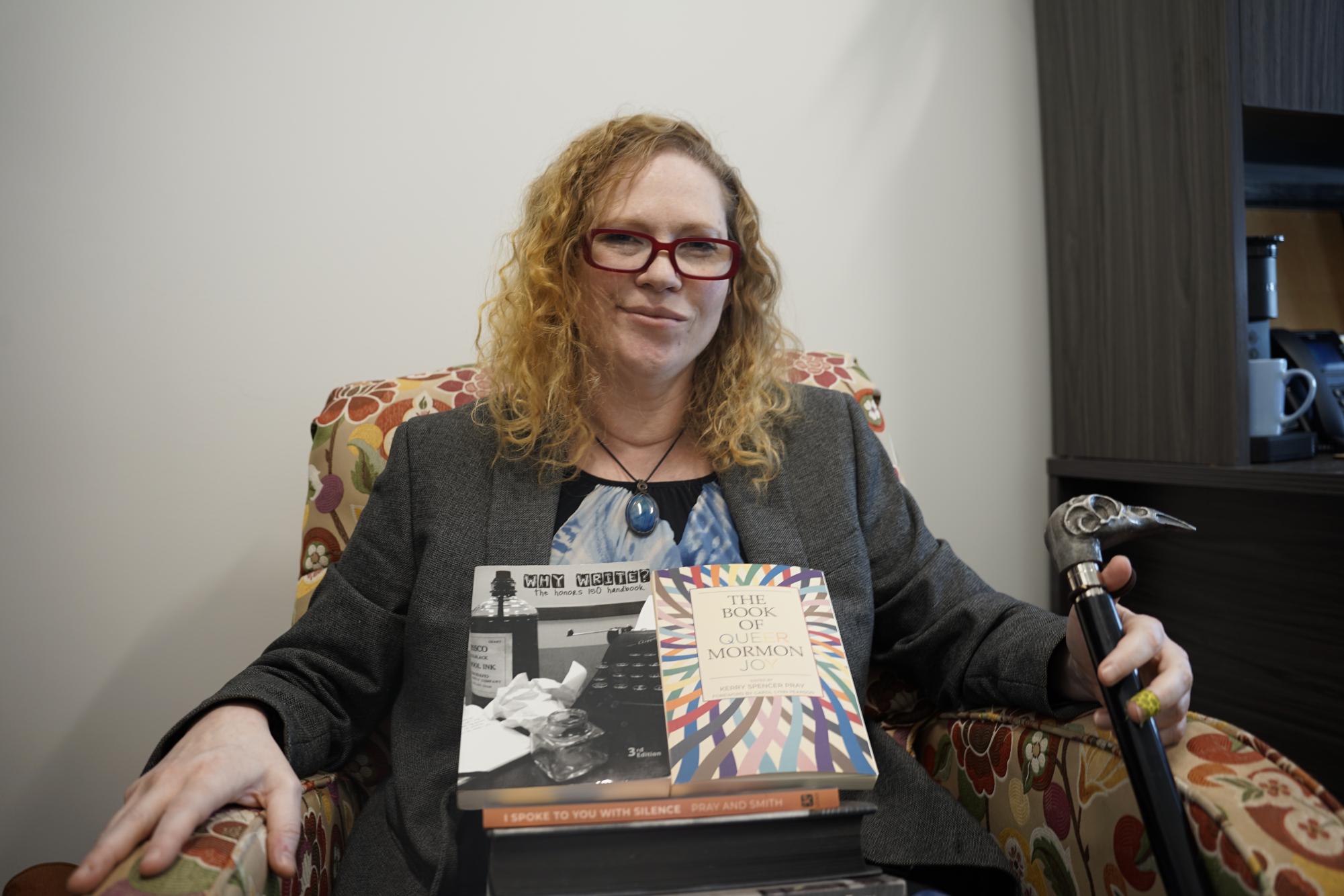







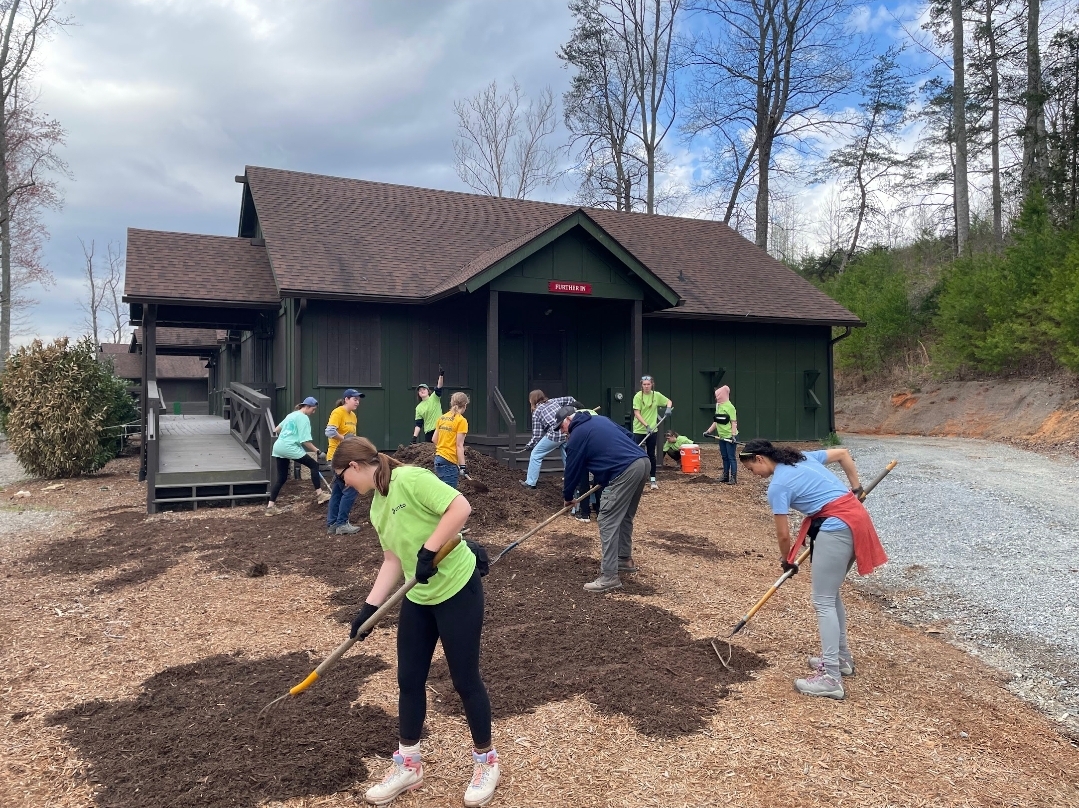

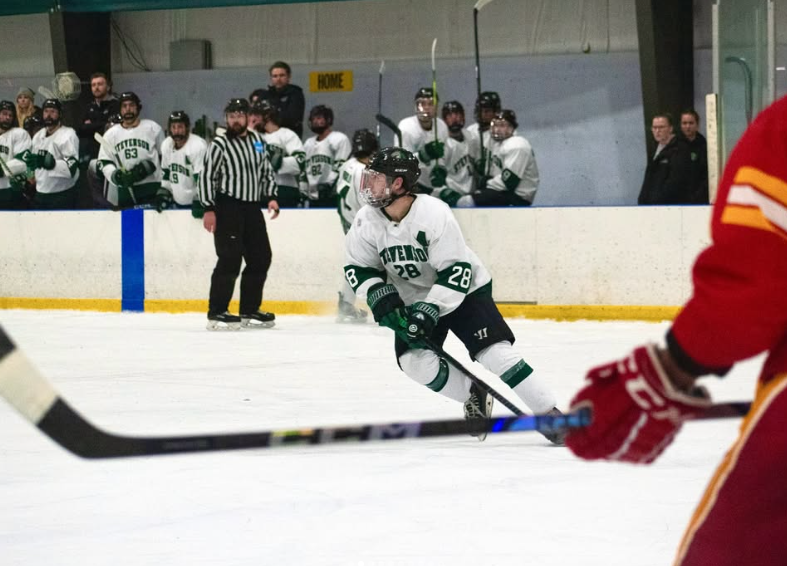









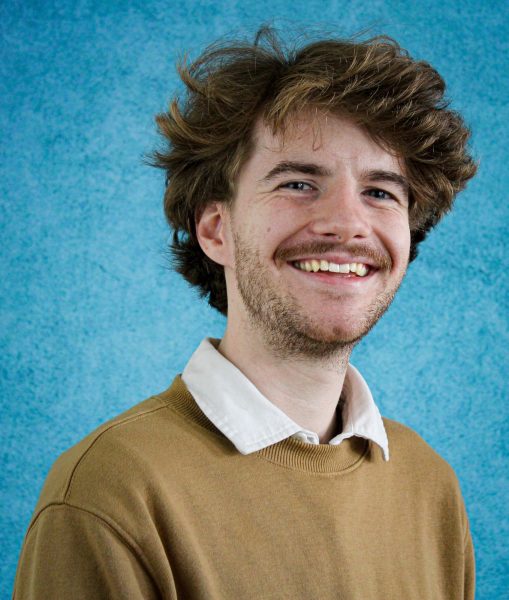
Leeanne M. Bell McManus • May 5, 2025 at 7:38 pm
Great article
Barb • Apr 8, 2025 at 11:50 am
Remarkable, strong, brilliant Kerry.
Dr. Kerry Spencer Pray • Apr 7, 2025 at 4:43 pm
This is so beautiful. Thank you Daniel.